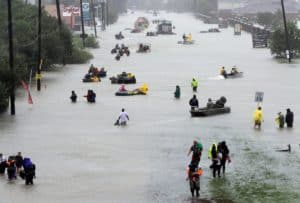As the nation’s attention turns towards Hurricane Irma and the potential of another catastrophic storm hitting the United States, Houston and its residents have only just begun the massive clean up and damage assessment from Hurricane Harvey. The storm itself has subsided to a tropical storm depression and to prevent more severe flooding, Houston is partially draining two reservoirs, which could submerge some homes for another 15 days. Numbers are still being tallied, but the Texas Department of Public Safety has estimated “200,000 homes have been damaged, with more than 13,500 destroyed, with estimates expected to rise as the hardest-hit areas become accessible.”
As Texans slowly make their way back to their homes and assess the damage for themselves, they will be faced with new, hard realities like the potential environmental threats left from the floodwaters in their homes and their communities.

Water
Safe drinking water remains a major worry for the areas hit by Harvey, and a report from the EPA has placed 160 drinking water systems under boil-water notices and 50 have been shut down altogether. The city of Beaumont with its 120,000 residents lost access to clean water as floodwaters knocked out water supply.
As frightening as that is, the flood waters also pose a major health risk. Bacteria lurking in flood water includes sewage, trash and dangerously high levels of E. coli bacteria and pollutants. The E.coli bacteria found in Harvey samples is more than 125x higher than what is recommended for swimming and 15x higher than the standard set for wading. And since Houston is a hub for oil & gas companies; oil, grease and other chemicals are expected to be contaminants. Exxon Mobil confirmed that two of its refineries (one in Bayton – the second largest refinery in the US – and the other in Beaumont) were damaged and releasing pollutants. Contaminated water can cause burns, infections, and rashes in the short term, and a host of other symptoms in the long term.
Health departments in the State of Texas are working quickly to get tetanus vaccines to those in affected areas and advise to wash thoroughly if you have been exposed to flood waters.
Mold
For everyone, and especially for families where a homecoming is a little farther out, mold is another major health concern. Mold growth intensifies in heat and waterlogged areas, and moisture control will be critical to help minimize health problems. The World Health Organization note that living or working amid mold is associated with respiratory symptoms, allergies, asthma, and immunological reaction and in rare cases – fatalities. Polluted water, high risk of infectious disease will eventually dissipate for Houston, but mold will remain a long term health concern.

Joe Raedle/Getty Images
Infectious Diseases
Public health experts are looking at lessons from 2005’s Hurricane Katrina in order to make health estimates about Houston’s road to recovery. During the first three weeks of Katrina’s aftermath, thirty cases of hurricane-associated MSRA were reported to the CDC from individuals staying at an evacuee center. As defined by Cleveland Clinic, MRSA is a staph infection causing skin infections, and what makes MRSA quite serious is its resistance to antibiotics. Besides MRSA, other infectious diseases are expected to emerge as a result of Harvey. After a major flooding and/or hurricane, mosquito populations usually increase. Besides the general annoyance of these insects, mosquito borne illnesses like Zika and yellow fever could be possible.
How to Help
As Houstonians grapple with the next steps towards recovery, charitable contributions have started to pour into the affected areas. However, fraudulent charities and coordination problems can divert aid from genuine resources. Here are some ideas for how to most effectively give aid for Harvey:
- Give to charities that are rated highly by Charity Navigator and org.
- Help respond to the full range of the hurricane’s effects. Flooding presents challenges for food, housing, farming, pet care, and many other specific issues. Choose the issues you care most about and contribute to a charity that’s well-positioned to respond. For example, you can donate to the SPCA of Texas if you want to help cover the cost of taking in displaced pets.
- Find local resources. Local organizations can bundle contributions and donate large amounts of aid to disaster relief groups on the ground. Even sports teams can get involved. In Raleigh, North Carolina, for example, the Carolina Hurricanes are collecting donations at their arena until September 8.
Readers looking to do their part for Hurricane Harvey relief should consider donating to Operation USA, International Relief Teams, the Houston Food Bank, and Direct Relief.
